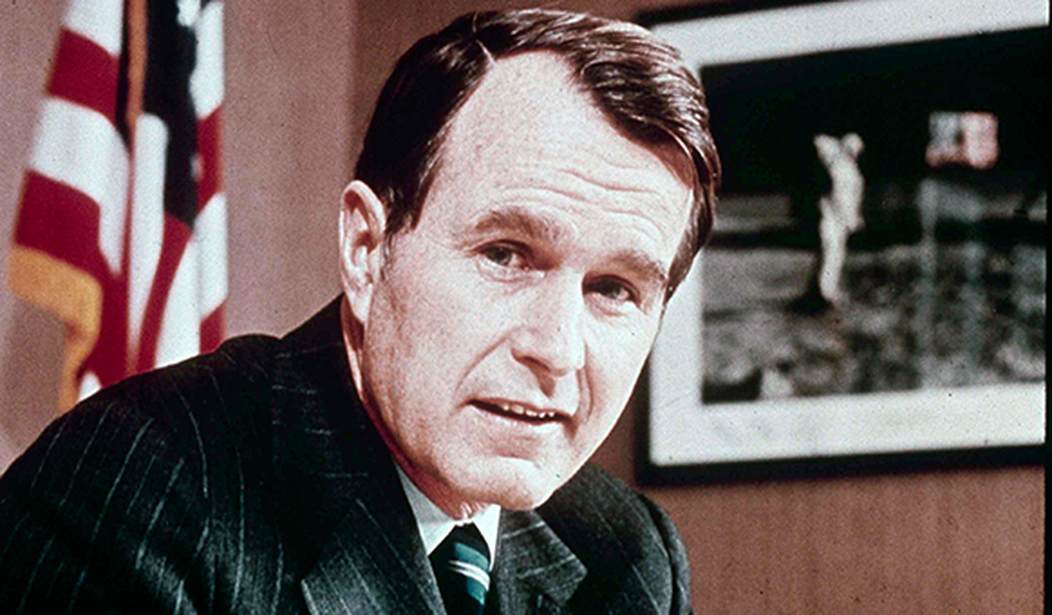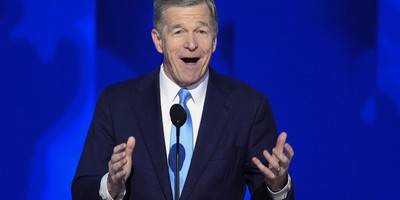Today we mourn the death of a truly great American, George Herbert Walker Bush -- heroic World War II combat-tested Navy bomber pilot, congressman, UN ambassador, envoy to China, CIA director, Vice President and President. His passing also represents the passing of an antiquated version of the Republican Party.
It has been said that no person possessed a resume better suited to the Oval Office than George H.W. Bush. In one sense, this is certainly true. In terms of understanding the processes, politics, and personalities that make the United States government function, Mr. Bush’s career was unparalleled as a foundation for assuming the role of President of the United States. His military, legislative, bureaucratic and executive experience gave him a panoply of perspectives from which to draw in his role as Commander in Chief.
On a personal level, by the accounts of those who knew or encountered him, from the exalted elites to the working man, Mr. Bush was a kind, caring, and self-effacing person who embodied a gentility that many people identified with the Republican Party itself. Everyone seems to forget, or at least fails to mention as they praise him in his passing, that he endured the slings and arrows of political detractors that went beyond policy differences and into the tawdry gutter of calumny. Mr. Bush responded to such attacks with great restraint.
To cite but one example, in the run-up to his 1992 reelection, an article was published repeating an unsubstantiated rumor contained in a footnote in a book, called “The Power House.” The article insinuated that Mr. Bush while Vice President had had an affair with a female staffer, Jennifer Fitzgerald. In the footnote used as the source, a State Department official, Louis Fields, said that he’d arranged for Mr. Bush to stay in the same guest house as a female staffer in Geneva in 1984 during nuclear disarmament talks. Mr. Fields never said he had first-hand knowledge of an affair, but the arrangement made him “uncomfortable.” By the time the article was published eight years later, Fields was dead and thus unable to expand on the nature of the reported lodging arrangements. But the innuendo from the footnote, reportedly promoted to reporters by Hillary Clinton herself, was picked up and inflated into a full-blown affair by various publications right before the 1992 presidential election.
Recommended
Mr. Bush was asked about it in a press conference with Israeli Prime Minister Yitzhak Rabin in Kennebunkport, Maine in August 1992 by CNN reporter Mary Tillotson. (Thus demonstrating CNN’s historical penchant for engaging in slimy political hits against Republican presidents using rumor and “fake news” in its role as an extension of the Democratic Party.)
Mr. Bush brushed the question aside, saying, “I'm not going to take any sleazy questions like that from CNN.” Ms. Tillotson’s fellow traveler, Stone Phillips of ABC News, would then complete the one-two punch by asking President Bush later that day in an interview at the White House if he’d ever had any extramarital affairs, despite being warned beforehand not to go there.
Imagine now if President Trump had been asked such a question at a press conference. Does anyone think for a moment that he would not have laced into the CNN reporter with a blistering personal attack, eviscerating the insolent journalist with a deserved verbal pummeling? It would have made President Trump’s dressing down of CNN reporter Jim Acosta on November 7 over Acosta’s questioning of Trump’s handling of an approaching horde of illegal immigrants threatening our border like an army of invading Visigoths look like Queen Elizabeth correcting a tardy footman.
President Trump represents a new Republican Party. In terms of personal comportment and professional preparation for the job of president, he is about as far removed from George H.W. Bush as one could possibly conceive.
Donald Trump, like many of us who hail from Queens, New York, possesses four distinct personality traits that were alien to Mr. Bush: bombast (or, perhaps more accurately, pugnaciousness), imprecision in his use of language, impetuosity and complete candor.
From a professional experience standpoint, Mr. Trump, unlike the career government official Mr. Bush, had zero political or government experience before running for President.
The differences between these two men are precisely the reasons that Mr. Trump was elected President. All presidents are to a great extent a reflection of the times in which they live and the needs of the country, as determined by the electorate. That is to say, the American people elevate the person to the White House whose personal attributes and message they deem necessary for the times in which they live.
Mr. Bush was elected president coming off the phenomenally successful presidency of Ronald Reagan -- himself a man of good humor, strong beliefs in the greatness of America and the free market system, and a deep loathing for the dehumanizing nature of Communism. Mr. Trump would never have been elected in the wake of such a presidency. The country perceived that it needed a decent man and capable administrator to succeed President Reagan and carry on his legacy, and Mr. Bush met that need well.
Mr. Trump on the other hand was elected in the aftermath of eight years of the presidency of Barack Obama, a man who made no secret of his belief that America was not exceptional, needed to be “fundamentally transformed” and had been arrogant, dismissive and derisive of its allies. His infamous “Apology Tour” still rankles. He incessantly lectured Americans over supposed man-caused climate change, accused us of being racist at every opportunity, and moralistically informed us that those who disagreed with his policies did not represent “who we are,” as though he were the final arbiter of American values.
America grew sick of it. And they recognized that the Republican Party, as represented in most of its elected Republicans, had become feckless and weak in the face of Obama and the Democratic Party. They wanted a fighter. They wanted someone who believed in America, would proclaim her greatness, and would not apologize for her.
As good a man as George H.W. Bush was to his very core, he represented a bygone Republican Party. The United States needed a transformed Republican Party in 2016 -- an assertive party, an unapologetic party, a combative party when necessary. Most importantly, it needed a leader who would break the mold of a genteel Grand Old Party that had grown timid, sclerotic, and passive. It needed Donald John Trump.
George H.W. Bush was the right man for his country in his time. Donald J. Trump is the right man for his country in his time. The old Republican Party needed to pass away and be infused with an unapologetic feistiness and renewed spirit. It accomplished that with Mr. Trump. Its rebirth may be its salvation.
William F. Marshall has been an intelligence analyst and investigator in the government, private and non-profit sectors for over 30 years. Presently he is a Senior Investigator for Judicial Watch, Inc. (The views expressed are the author’s alone, and not necessarily those of Judicial Watch.)

























Join the conversation as a VIP Member